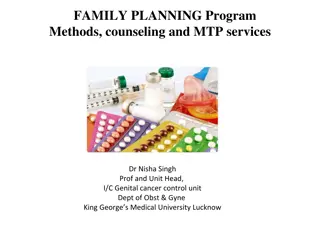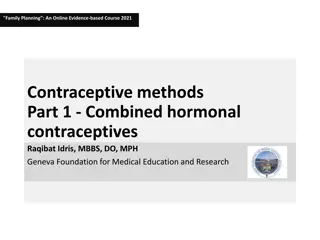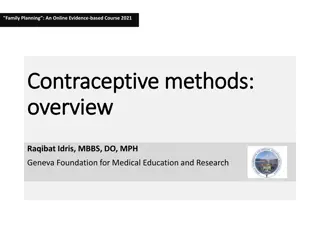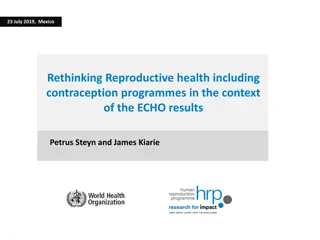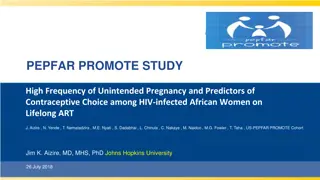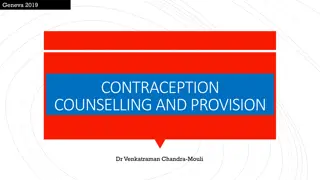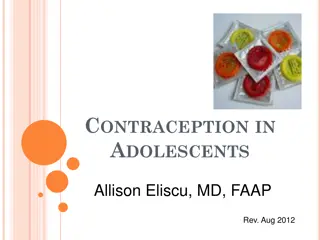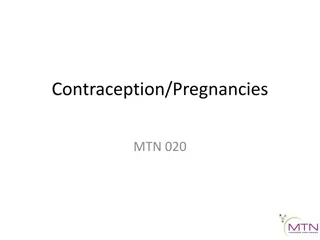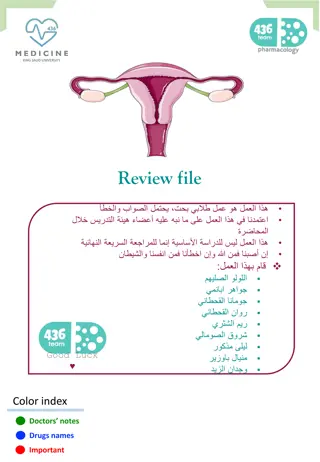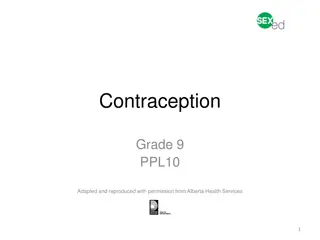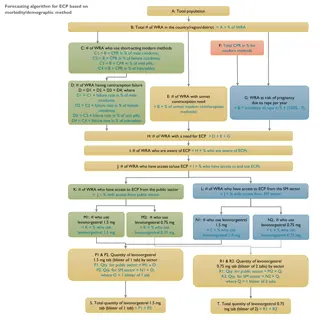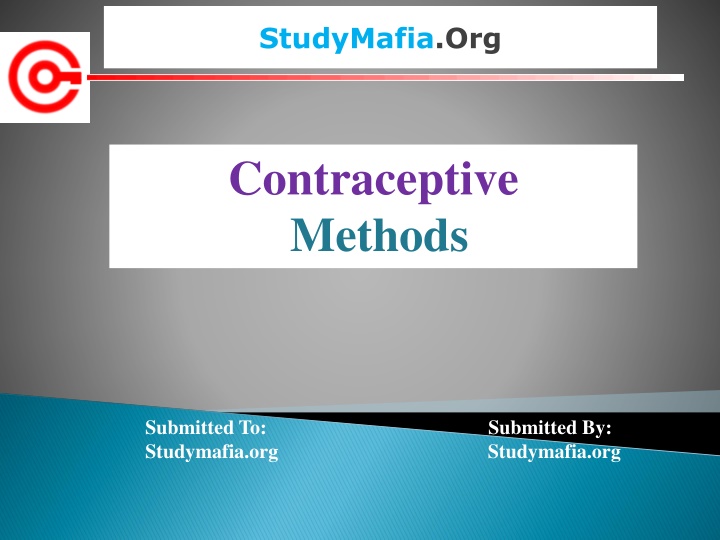
Contraceptive Methods: Types, Uses, and Benefits
Learn about various contraceptive methods to prevent pregnancy, including hormonal options like pills, implants, and injectables. Discover how these methods work, where to access them, and considerations for choosing the right one for you.
Download Presentation

Please find below an Image/Link to download the presentation.
The content on the website is provided AS IS for your information and personal use only. It may not be sold, licensed, or shared on other websites without obtaining consent from the author. If you encounter any issues during the download, it is possible that the publisher has removed the file from their server.
You are allowed to download the files provided on this website for personal or commercial use, subject to the condition that they are used lawfully. All files are the property of their respective owners.
The content on the website is provided AS IS for your information and personal use only. It may not be sold, licensed, or shared on other websites without obtaining consent from the author.
E N D
Presentation Transcript
StudyMafia.Org Contraceptive Methods Submitted To: Studymafia.org Studymafia.org Submitted By:
Table Contents Definition Introduction Types of Contraceptive Methods How Do You Know Which Method To Use? Where to get contraception? Conclusion 2
Definition Contraception is a way to prevent pregnancy. There are many different types of contraception and some are more effective than others. 3
Introduction Contraception tries to stop man's sperm reaches one of her eggs (ova). by: keeping the egg and sperm apart stopping egg production stopping the combined sperm and egg (fertilised egg) attaching to the lining of the womb Contraception is free for most people in the UK. Condoms can also be bought in pharmacies and supermarkets. 4
Types of Contraceptive Methods Hormonal contraceptive methods include oral contraceptives pills, injectables, and implants. They all prevent pregnancy mainly by stopping a woman s ovaries from releasing eggs. Hormonal methods contain either one or two female sex hormones that are similar to the hormones naturally produced by a woman s body. 6
Types of Contraceptive Methods Oral contraceptive pills should be taken one pill every day. They are most effective when no pills are missed, the pill is taken at the same time every day, and each new pack of pills is started without a delay. 7
Types of Contraceptive Methods Injectable contraceptives are given by injection into a woman s arm or buttocks once every 1, 2, or 3 months, depending on the type of injectable. Injectables are most effective when women remember to come back for re-injection on time. 8
Types of Contraceptive Methods Contraceptive implants are inserted under the skin of a woman s upper arm and provide continuous, highly effective pregnancy protection for 3 to 5 years, depending on the type of implant. When this time is over, new implants can be inserted during the same visit that the old set is removed. 9
Types of Contraceptive Methods Emergency contraceptive pills (ECPs) can help prevent pregnancy if taken within 5 days after unprotected sex. The sooner they are taken, the more effective they are. They are NOT meant to be used for ongoing contraception, in place of a regular method. 10
Types of Contraceptive Methods Intrauterine contraceptive devices (IUDs or IUCDs) are small, flexible plastic devices that are inserted into the woman s uterus. The most common IUDs contain copper, and they work by preventing sperm from reaching an egg. Depending on the type, IUDs can provide protection for 5 to 12 years. 11
Types of Contraceptive Methods Barrier methods are either devices (male and female condoms) that physically block sperm from reaching an egg, or chemicals (spermicides) that kill or damage the sperm in the vagina. The effectiveness of barrier methods greatly depends on people s ability to use them correctly every time they have sex. 12
How Do You Know Which Method To Use? Some forms of contraception are more effective than others. Some, particularly Long Acting Reversible Contraception (LARCs) are more than 99% effective at preventing pregnancy. Your doctor or nurse can talk with you about making sure your contraception is as effective as possible for instance, taking a hormonal contraceptive pill every day, without a monthly break. 13
How Do You Know Which Method To Use? Different methods suit different people. Your choice of contraception may change depending on your age, your health and the status of your relationship. The nurse or doctor will ask about your health and your family s health so they can recommend the safest contraception for you. 14
Where to get contraception? Contraceptive services are free and confidential. This includes services for people under 16, as long as they're mature enough to understand the information and the decisions involved. There are strict guidelines for healthcare professionals who work with people under 16. 15
Where to get contraception? You can get contraception for free from: most GP surgeries (talk to your GP or practice nurse) community contraception clinics sexual health clinics (these offer contraceptive and STI testing services) some young people's services 16
Conclusion Although contraception in general is safer than pregnancy, it is nonetheless important to consider contraceptive risks and benefits in relation to the characteristics of different women. 18

